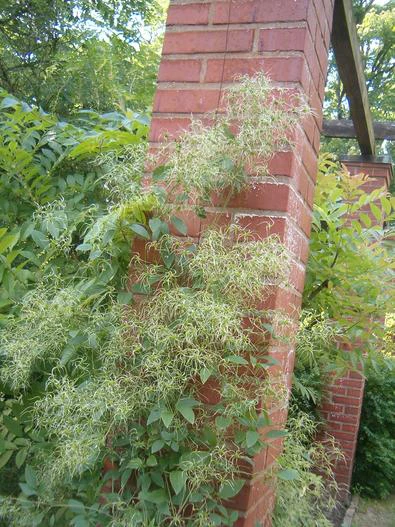(Clematis terniflora var. mandshurica)
(Clematis terniflora var. mandshurica)
/
/

BotBln
CC BY-SA 3.0
Image By:
BotBln
Recorded By:
Copyright:
CC BY-SA 3.0
Copyright Notice:
Photo by: BotBln | License Type: CC BY-SA 3.0 | License URL: https://creativecommons.org/licenses/by-sa/3.0 | Uploader: BotBln | Publisher: Wikipedia Commons







Estimated Native Range
Climate Requirements
| • Precipitation | 45" - 54" |
| • High Temp. | 77°F - 84°F |
| • Low Temp. | -15°F - 30°F |
Summary
Clematis terniflora var. mandshuricamandshurica is is a deciduous vine native to Eastern Asia, where it is often found in forest edges, scrub and along rivers. It grows rapidly to a height of 10-15 feet (3-4.6 meters) and a width of 4-6 feet (1.2-1.8 meters), and is valued for its profuse, fragrant, star-shaped white flowers that appear from late summer to autumn, creating a spectacular display. It is often used to cover fences, trellises, and arbors, providing a quick screen or vertical interest in the garden. Regular pruning is necessary to control its size and encourage blooming. While generally disease-resistant, it can be susceptible to clematis wilt. Overgrowth can be an issue, so it should be planted where it can be managed. It is not considered invasive in its native range but can become so when introduced to new areas.
This Clematis prefers a sunny to partly shaded location with well-drained soil, ideally with its roots shaded and the vine in the sun. It is adaptable to various soil types, including loamy or sandy soils, as long as they are well-drained. It requires regular watering, especially during dry periods, but does not tolerate waterlogged conditions. Mulching helps retain soil moisture and keeps the root zone cool. It is important to provide support for the vine to climb on, as it uses its leaf stalks to twine around structures.CC BY-SA 4.0
This Clematis prefers a sunny to partly shaded location with well-drained soil, ideally with its roots shaded and the vine in the sun. It is adaptable to various soil types, including loamy or sandy soils, as long as they are well-drained. It requires regular watering, especially during dry periods, but does not tolerate waterlogged conditions. Mulching helps retain soil moisture and keeps the root zone cool. It is important to provide support for the vine to climb on, as it uses its leaf stalks to twine around structures.CC BY-SA 4.0
Plant Description
- Plant Type: Vine
- Height: 10-15 feet
- Width: 4-6 feet
- Growth Rate: Rapid
- Flower Color: White
- Flowering Season: Summer, Fall
- Leaf Retention: Deciduous
Growth Requirements
- Sun: Full Sun, Part Shade
- Water: Medium
- Drainage: Medium
Common Uses
Bird Garden, Border Plant, Butterfly Garden, Fragrant, Hummingbird Garden, Low Maintenance, Potted Plant, Showy Flowers
Natural Habitat
Forest edges, scrub, and along rivers in Eastern Asia
Other Names
Common Names: Sweet Autumn Clematis, Virgin’s Bower, Yam-leaved Clematis
Scientific Names: Clematis terniflora var. mandshurica, Clematis liaotungensis, Clematis mandschurica f. pubescens, Clematis mandshurica, Clematis mandshurica f. lancifolia, Clematis mandshurica f. pubescens, Clematis mandshurica var. lancifolia, Clematis mandshurica var. orientalis, Clematis manshurica
GBIF Accepted Name: Clematis terniflora var. mandshurica